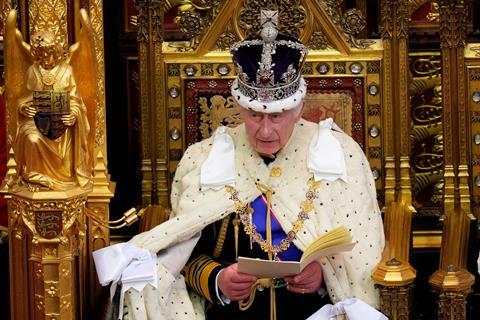The Evangelical Alliance’s Danny Webster explains what the King’s Speech might mean for Christians and churches

Although it was the King on the throne reading the speech yesterday, this ancient, ceremonial aspect of our politics - known as the State Opening of Parliament - is very much a political act by the party in government. This is always the case but, in the present context, with an election due in the next 14 months, it was even more so this time round.
Parliamentary activity is broken into sessions, each started with a monarch’s speech that sets out the programme for their government. This is why you hear the King talk about “his ministers”. The speech does not mean that everything set out will become law - that will be dependent on the parliamentary schedule, how smooth the passage of bills goes, when an election is called and what else the government decides to do. And equally, just because something wasn’t mentioned in the speech, it doesn’t stop the government from introducing it as a potential new law anyway.
Content and circumstance
This King’s Speech was somewhat light on content, with broad, aspirational comments made about increasing economic growth and safeguarding the health and security of the nation. And although there were 21 potential new laws announced, seven of these have already begun their parliamentary process. The Labour Party’s immediate response picked up on this, with one MP even (somewhat exaggeratedly) declaring that it could all be passed in a fortnight.
The most notable absence from a Christian perspective was a law on conversion therapy
Many of the plans set out had been previously discussed, including reform to rental markets, football governance and smoking. One of the bills most likely to attract political disagreement proposes continued licenses for oil and gas extraction in the North Sea, although placing this bill before parliament also pushes the Labour Party to take a position on the issue - one which affects many jobs in Scotland, where the party is looking to gain seats.
One piece of legislation that may impact Christians is the Terrorism (Protection of Premises) Bill. This has been proposed in the wake of the Manchester Arena bombing and will introduce new responsibilities for venues open to the public. No new responsibilities will apply to venues with a capacity below 100, a standard level to those between 100 and 800, and an enhanced level for venues larger than this. It is likely that these duties will apply to churches and this is an area the Evangelical Alliance will be engaging with as the proposed law progresses.
Notable absence
The most notable absence from the speech (from a Christian perspective at least) was a law on conversion therapy. In the previous speech in May 2022, plans were set out for a draft bill, following a consultation that had taken place a few months previously.
Since then, there have been numerous rumoured changes of direction and occasional commitments to introducing legislation. In the past month alone, it has been suggested that there would be no new bill – on the basis that existing laws tackle abusive practices and new laws risked undermining individual choice and religious freedom – followed by pushback, and a brief that a draft law would be introduced for scrutiny by a committee of MPs.
The Evangelical Alliance, along with many other Christian organisations and churches, as well as others outside of the Church, raised many concerns about the potential consequences of poor legislation in this area. The point has often been made (which is now being acknowledged by government) that where abuse is taking place, it can and should be addressed through existing laws.
This King’s Speech was somewhat light on content
New laws would either be for symbolic signally purposes – to be seen to be ‘doing’ something – or would have the effect of either criminalising someone for promoting orthodox Christian teaching on sexuality, or prevent individuals from choosing to receive prayer or counselling.
If the government has seen sense and recognised that new legislation poses significant risks, and effective action can be taken without it, then this is a positive step. However, it is important to note that there are politicians across all parties who want to introduce this change. So there may well be amendments offered to other legislation to try and do this. Ahead of the next election, it is also important for other parties to reflect on what legislation around conversion therapy might mean, and whether this is something that will appeal to voters when they go to the ballot box.






































No comments yet